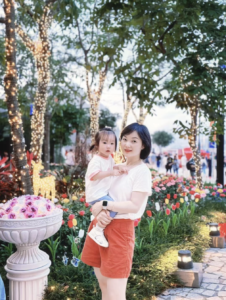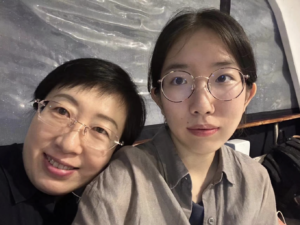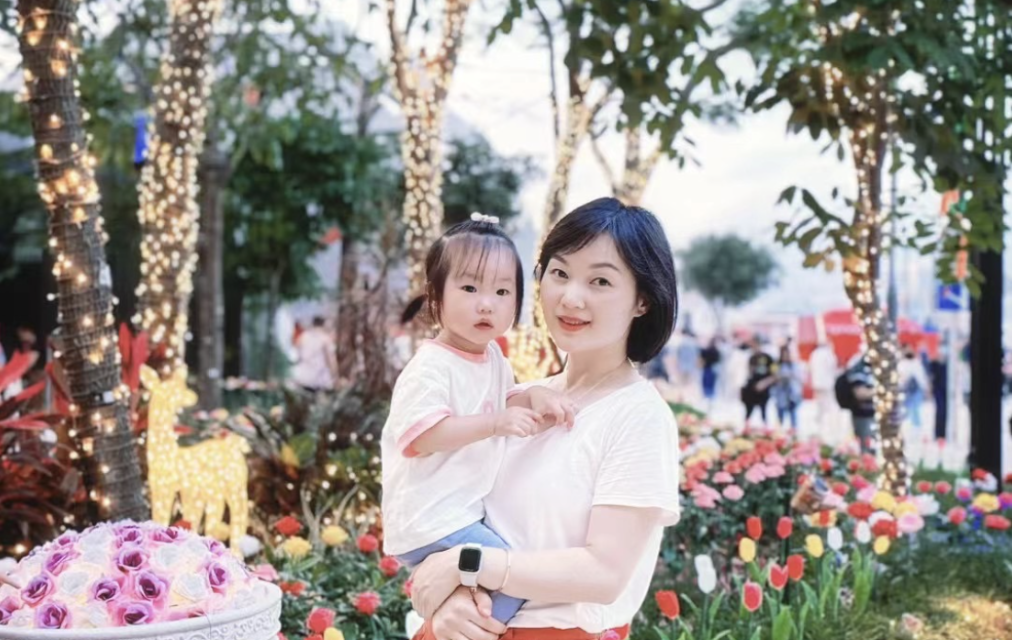By Sarah Jiang Yue
HKU Journalism and Media Studies Centre
Sunny Deng, 42, gave up her “iron rice bowl” job as a medical doctor in Sichuan province, and sold three of her cars, her house and other family belongings in order to bring her 12-year-old son and one-year-old daughter to Hong Kong in July 2023.
“My mum kept asking me why I gave up my doctor job, and she couldn’t understand why I made this decision,” said Deng. “But I always think it was the right decision as I can do anything for my children.”
She is one of a growing number of mainland parents making sacrifices to settle themselves in Hong Kong simply for their children’s education and future.

Sunny Deng sold her house and cars and moved to Hong Kong for her children’s education.
Courtesy: Sunny Deng
Hong Kong has become an increasingly attractive education destination for mainland children because parents consider it as a better place to educate their kids compared with the Chinese mainland due to the city’s relatively less stressful learning environment and higher standard of English instruction.
Its proximity, safety and cultural similarity compared to other countries such as the United States or the UK, also add to the city’s attraction.
Whereas an increasing number of Hong Kong residents still go to the mainland for eating, doing physical checkups and shopping, these parents sold their houses and cars, shut down their companies and gave up their careers, and even separated the family to come to Hong Kong all for the schools, one of the main things that Hong Kong offers which many mainlanders still consider better than the mainland.
After arriving in Hong Kong, however, they have difficulty understanding Cantonese, finding a job, and adapting to life in the fast-paced and expensive city.
“For my occupation, I was thinking about becoming a doctor again in Hong Kong, but I gave up this idea when I thought I needed to experience the hardest part again such as taking the license exam and doing training sessions ,” said Deng.
A growing trend
The Hong Kong Immigration Department does not provide statistics regarding the exact number of mainland parents moving to Hong Kong with their children.
However, the Hong Kong Education Bureau’s data showed that the number of newly admitted students from the mainland for both primary and secondary education has steadily increased in recent years
After Hong Kong reopened its border to the mainland at the end of 2022, the number of newly admitted mainland students for secondary education doubled from the 2021/22 school year to the 2023/24 school year, reaching a total of 2,343 students. The number of students for primary education also nearly doubled during the same period to 4,488 students.
“The movement of students from the mainland to Hong Kong is by no means a new phenomenon, and there will be a continuing flow of mainland students because 150 mainlanders are allowed to enter Hong Kong daily,” said Professor Kerry Kennedy, advisor and member of the Department of Curriculum and Instruction at The Education University of Hong Kong.
He was referring to the policy that allows 150 mainland residents who are the spouse or child of Hong Kongers to settle in Hong Kong and eventually apply for One-Way Permits which allow them permanent residency.
However, there is evidence that mainlanders without family members here are also moving to Hong Kong with their children under different schemes, such as the Top Talent Pass Scheme, Admission Scheme for Mainland Talents and Professionals, and Quality Migrant Admission Scheme, all of which are aimed at helping Hong Kong attract more talent
According to the government, around 81,000 mainlanders have entered Hong Kong on these schemes, while some have yet to move here after being approved, but the government, including the Education Bureau, does not provide specific statistics on how many were granted permission to live here with their children.
| Immigration Schemes / policies | Number of mainland China applications approved | ||
| 2021 | 2022 | 2023 | |
| Top Talent Pass Scheme (TTPS) | N/A | 838 | 47 021 |
| Admission Scheme for Mainland Talents and Professionals (ASMTP) | 9 065 | 11 768 | 19 757 |
| Technology Talent Admission Scheme (TechTAS) | 31 | 46 | 114 |
| Immigration Arrangements for Non-local Graduates (IANG) | 6 105 | 9 126 | 24 650 |
| Quality Migrant Admission Scheme (QMAS) | 1 860 | 2 719 | 12 775 |
| Dependant (of approved applicants) | 7 467 | 14 310 | 94 310 |
| Student | 37 087 | 40 161 | 54 453 |
Source: Hong Kong Immigration Department
Still, there is evidence of this growing trend.
On social media platforms such as Xiaohongshu, a large number of support groups have been set up in the past two years for these mainland parents. They make friends through this platform, which helps them better adapt to life in Hong Kong.
As these parents are newly-arrived in Hong Kong, they would use Xiaohongshu to ask questions such as how to find a school for their children, how to rent a flat, and how to find a suitable Filipino domestic worker.
“More and more mainland parents sent messages to me, and they want me to share more,” said Weiling Shen, 39, the founder of one such support group and a mainland mother who moved to Hong Kong in 2009. “I realized that there is an increasing number of mainland parents coming to Hong Kong.”
More suitable for children with special needs
Deng had long been curious about raising her son in Hong Kong, but she and her family had initially thought they could not adapt to life in Hong Kong and they would be overwhelmed by the high cost of living, but in June 2023, Deng’s son was diagnosed with Attention Deficit Hyperactivity Disorder (ADHD).
“In the mainland, there are only two medicines for treating this problem, and my son experienced lots of side effects after taking the medicine, but there are nearly 20 different and more advanced medicines for treating this problem in Hong Kong,” said Deng. “Hong Kong schools also provide comprehensive support for this kind of special child.”
After considering her son could receive advanced ADHD treatment and have a better education environment in Hong Kong, Deng made the decision to leave their home in Sichuan province and moved to Hong Kong in only one month.
She quickly sold out all her belongings and resigned from her job. Her colleagues all felt quite sad about her leaving, but she recalled she and her son were excited about their new life in Hong Kong
“I told my son there will be less stress when studying in Hong Kong, my son became quite happy and even excited about his school life in Hong Kong,’’ said Deng.
A less competitive education environment
Li Ning, a Beijing resident who worked as an IT engineer, said she made the decision to move to Hong Kong in only two months because her daughter ranked in the middle of her class in a recent exam, and it is very hard to enter into a top high school in the mainland without better grades.
“Although my daughter could enter into a high school (in Beijing), it is still difficult for her to enter into a top university if she decides to go to school in Beijing,” said Li.
Li mentioned that her daughter is also very sensitive as teachers would not pay attention to her because she is not one of the top students in the class.
“I thought moving to Hong Kong to study would be a better choice for my daughter, and she could even develop more skills instead of focusing only on her studies,” said Li.
Li applied to come to Hong Kong through the Quality Migrant Admission scheme and was accepted because she had graduated from a top university and had more than 20 years of experience working as an IT engineer.
She then did a lot of preparations regarding selecting schools for her daughter and spoke to a teacher who worked at a local school.
“I thought the Hong Kong Diploma of Secondary Education (HKDSE) curriculum is more suitable for my daughter, which is easier than the curriculum in the mainland, ” said Li.
Escaping the stress
Annie He, 38, previously worked as an English teacher for 10 years in a famous English training school called Beijing New Oriental.
She left a suburb of Beijing and brought her two children to Hong Kong to receive education while studying for her master degree at Lingnan University.
“I feel like the education system in mainland China is cruel and stressful for both parents and children. By working as an English teacher, I have seen lots of parents and students who are harmed by this kind of stress,” said He, “I would like to escape from that kind of stress and have more freedom.”
He lived in a suburban area of Beijing where there are not many top schools. She thought it would be very hard for her child to enter into top schools in Beijing. Either her 14-year-old child would have to have excellent grades or her family would have to live in a district with the top schools.

Annie He chose to move to Hong Kong, instead of the U.S. or Canada, for her children’s education because of its proximity to the mainland and lower cost of living.
Courtesy: Annie He
“As an education destination, Hong Kong is attractive for me because I have lots of schools to choose for my kids,” she said.
Before He made the decision to come to Hong Kong, she also considered moving to America, Canada or Thailand so that her children could receive a better education, and many friends around her had already made that decision to move to those countries.
However, the high cost of living in those places and the far location from home made He give up this decision of moving abroad. Instead, she chose Hong Kong as it is closer to her home.
“I thought we could come to Hong Kong to have a try,” said He. “If my children cannot adapt to the education environment in Hong Kong, we can still go back home.”
Problems they face
While the mainland education system is considered by the families to be generally more demanding and stressful, Hong Kong’s education system still poses challenges for the newcomers because the language of instruction is often in Cantonese and sometimes in English. Many kids find it is hard to adapt to the new system, and they cannot perform well in some subjects because of the language issue.
Li’s daughter Zoe said most mainland students excel in mathematics because they all had a good foundation when studying math in the mainland, but that wasn’t the case for other subjects.
“Some subjects such as economics are taught in English, which I found is hard for mainland students to learn, ” said Zoe.

Li Ning and her daughter Zoe have coped with a lot of difficulties after moving to Hong Kong for Zoe’s education.
Courtesy: Li Ning
Many mainland students also found it difficult to build a friendship with local students.
“Some local students still look at us through coloured spectacles and do not want to make friends with us. Sometimes they even deliberately do not want us to know what they are talking about,” Zoe said.
Meanwhile, her mother, Li, realized that Cantonese was a major barrier for her. Most of her training sessions during her job working as an insurance agent are conducted in Cantonese. Although she watches a lot of Cantonese television shows and takes Cantonese lessons, she still cannot speak Cantonese or even understand the dialect.
The majority of these mainland mothers and their children also face the problem of separating themselves from other family members as their husband/father work in the mainland in order to support their living expenses in Hong Kong.
“I always really miss my husband and my mother. We can only see each other through video calls,” said He, “It is tough for me to take care of two children by myself in Hong Kong, and I want to get some help from my family members.”
He said she sends messages to her husband every day to tell him how the kids are doing at school. They also do video calls each day to see each other online.
“At the beginning, my kids, especially my daughter, really missed their daddy and almost cried every day, but now they are all getting used to seeing each other through video calls, ” said He.
On top of these major adjustments, the families also have to deal with uncertainty.
Mainland parents face the issue of the renewal of their visa status as most of them came here through the talent scheme, which is only a three-year-long program.
“We all feel overwhelmed and anxious as we need to renew our visa after three years, and our kids may not be able to continue to study in Hong Kong if we cannot renew our visa,” said Li.
Coping with difficulties together
Although these parents could get help from the Xiaohongshu platforms, some of them still find it hard to adapt to life in Hong Kong.
Through the social media support groups, the mainland parents got to know each other and began helping one another.
Shen established her support group called Hong Kong Accompanying Mothers Group last September when she saw a need by the families to help each other. She set up this social media group to help mainland people to cope with difficulties they experienced after moving to Hong Kong, especially how to educate children.
It now has around 200 group members.
“I wrote some posts on Xiaohongshu to share some tips regarding how to select a suitable domestic helper, how to educate children, and how to build a good relationship with your children,” said Shen.
As these mainland parents feel lonely and keep encountering new problems such as those involving their children’s education in Hong Kong, they seek help from other parents.
“Some mainland parents might find out that English becomes their children’s weakness after studying in Hong Kong. They were quite worried about how to help their children to increase their English scores,” said Shen.
In her social media group, Shen shared some tips on how she helped her daughter learn English and she regularly adds useful material and advice to the group.
Besides helping each other in the support group, Shen also organizes monthly events, including lunches, for these mainland mothers to meet each other to discuss their worries.
Being brave to deal with issues
Deng initially struggled with educating her son, and she did not know what her son was learning at school.
Deng’s son went to an international school at first, but he kept playing computer games at school, and the school did not pay any special attention to him, which disappointed her a lot, she said.
She later changed her attitude towards him after she saw a psychiatrist in Hong Kong who specializes in helping children with ADHD.
“The psychiatrist told me that this kind of child will never be like a normal child, and this kind of child will only be interested in a small amount of things,” said Deng. “When I heard this, I was having a mental breakdown. I lowered my expectations for my child, and I just wanted my child to finish his study successfully.”
In February, Deng started supervising and teaching her son some school work at home instead of going to that international school. Her son is now studying at a local public school which is free, and he can study in this school until he goes to high school.
“I remember during the interview, the school principal showed empathy to my child and even taught my child some Cantonese words,” said Deng.
As recently as three months ago, Deng was still quite skeptical about whether her decision of moving to Hong Kong is correct or not.
“Sometimes when my kids were intractable, and my mood was not good, I would miss life on the mainland, ” said Deng, “When I walked on the street late at night, looking at the houses and lights, I felt quite sad as I do not have any relatives here and I need to look after my two kids.”
Deng is now fully adapted to life in Hong Kong..
Deng mentioned that developing a positive attitude is important for adapting to life in Hong Kong, Deng said..
“When I experienced some bad things, I always told myself that I would discover some new things and learn some new skills,” said Deng.
Li, the Beijing IT engineer, realized that the job market in Hong Kong is narrow. Although she had many years of experience working in the IT industry in the mainland, she could not find a job in the same sector in Hong Kong.
She found out that some jobs which are available in the mainland do not exist in Hong Kong.
“I think the biggest difficulty for most mainland parents is how to enter the job market in Hong Kong, ” said Li, 50, who now works as an insurance agent. “Most mainland parents just pay all the attention to their children when in Hong Kong, and they find it is quite hard to find a job in Hong Kong.”
What motivated her to keep looking for a job, even if it’s not in the field that she prefers, was seeing her daughter working hard to adapt to life in Hong Kong.
Her daughter Zoe made friends after more mainland students transferred to her class during the school year, Li said.
Zoe said she experienced less stress studying in Hong Kong.
“I found out teachers will not give stress to students, and I even have high expectations for myself, ” said Zoe.
Li was so proud when she found out that her daughter had become more independent and was well-adapted to life in Hong Kong.
“I realized I should also do some things to let my kids see that I am also making some progress,” said Li.
Li was lucky enough to find a job later as an insurance agent. It’s very different from the job she had in Beijing but she enjoys working with her colleagues.
He, meanwhile, admits that she still feels overwhelmed by the financial pressure of living in Hong Kong, and that it is quite hard for her to take care of her two children without the help from her family.
“The hardest thing for me in Hong Kong is the financial pressure because I do not have a job at the moment. Living expenses are paid from the money my husband earned and money we saved in the past,” said He.
He, however, also finds joy in seeing the positive changes in her children after moving to Hong Kong.
“My son has more time to develop his hobbies. He experiences less stress. He performs well in sports and he makes lots of good friends in Hong Kong,” said He, “My daughter’s kindergarten organizes lots of events, and my daughter never cries when she goes to school.”
Look toward the future
Now that they have gotten used to living in Hong Kong, the mainland mothers are even considering staying here in the future.
Deng has made short term goals and long term goals for herself.
“In the short term, I would like to try my best to take good care of my two children and build a good relationship with them,” said Deng, “In the long term, I would like my children to become global citizens. One day, we could buy a house in Hong Kong, and our family will not be separated.”
Li said although she experienced a lot of difficulties which she did not expect during the first year of moving to Hong Kong, she thinks she will still see it as a brave decision when she looks back several years from now.
“I described myself as an “unbeatable cockroach,” said Li, “Although I face the pressure of taking care of both my daughter and my elder parents, I still think this is the most correct decision I have made in my life so far.”
“In the future, I hope my daughter could enter into a good university in Hong Kong, and we could all get a permanent identity in Hong Kong,” she said.
He is currently focused on finding a job to relieve the financial burden on her husband. Her goal is to start taking the Hong Kong civil service examinations. She would like to work in a government department after she obtains the permanent identity.
“Although it is tough for me to look after two children at the moment and feel devastated when my children were naughty and did not listen to me, it is still a right decision for us to move to Hong Kong as I can see my children experience less stress and enjoy the study life in Hong Kong.”
Advisor: Cindy Sui

